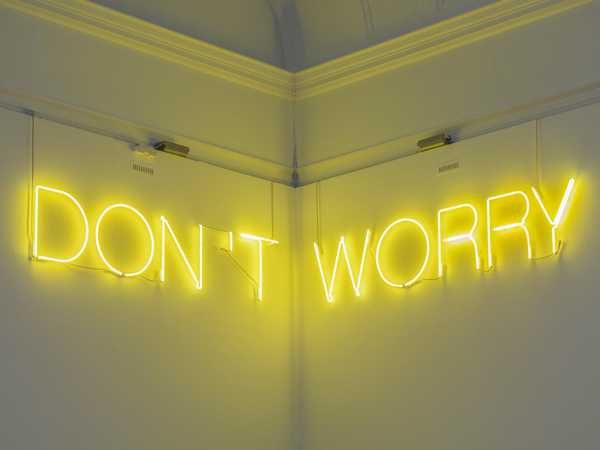Memory Mistake of the Eldridge Cleaver Pants
2008 - Sculpture (Sculpture)
Paul McCarthy
Memory Mistake of the Eldridge Cleaver Pants was created for the show Paul McCarthy’s Low Life Slow Life Part 1 , held at California College of the Arts’s Wattis Institute in 2008 and curated by McCarthy himself. In homage to an influence in his early career, McCarthy attempted to reconstruct a pair of pants worn by Black Panther revolutionary Eldridge Cleaver in a picture that appeared in Rolling Stone magazine in the 1970s. But in the process, McCarthy misremembered their original design of the pants, which had black outer panels and white inner panels in white, and left a black shape highlighted in the crotch area. Instead, McCarthy’s reconstruction divides the pants vertically in two black and white sections. McCarthy’s mistake speaks not only of the fallibility of memory but of a certain kind of queerness that resists any categorical—“black or white”—definition. Memory Mistake ’s use of aesthetic formalism, error, subjectivity, and social history can be seen to challenge the tropes of modernism and art history.
Known for his transgressive performance art pieces that often challenge social conventions, Paul McCarthy is undoubtedly one of the main figures in the West Coast contemporary art scene. Using different forms from pop culture as source material, McCarthy casts a critical look at American society and consumerism. With a particularly poignant sense humor, his works also investigate the intricacies of human psychology.
Colors:
Other related works, blended automatically

© » KADIST
Paul McCarthy
2010To make Mickey Mouse (2010), Paul McCarthy altered a found photograph—not of the iconic cartoon, but of a man costumed as Mickey...

© » KADIST
Gregory Crewdson
2005Forest Gathering N.2 is part of the series of photographs Beneath the Roses (2003-2005) where anonymous townscapes, forest clearings and broad, desolate streets are revealed as sites of mystery and wonder; similarly, ostensibly banal interiors become the staging grounds for strange human scenarios...

© » KADIST
Trisha Donnelly
2007Untitled is a black-and-white photograph of a wave just before it breaks as seen from the distance of an overlook...

© » KADIST
Petra Cortright
2012In the flash animation SpringValle_ber_girls , Petra Cortright collages together surreal scenes out of unnaturally idyllic desktop screensavers with equally unreal computer-generated women that pop in and out of the landscape...

© » KADIST
Alexis Smith
1995In 8 Ball Surfboard (1995),Alexis Smith combines her long-term interests in California culture and conceptual assemblage...

© » KADIST
Raymond Pettibon
2006The five works included in the Kadist Collection are representative of Pettibon’s complex drawings which are much more narrative than comics or cartoon...

© » KADIST
Juan Capistran
2005White Minority , is typical of Capistran’s sampling of high art genres and living subcultures in which the artist subsumes an object’s high art pedigree within a vernacular art form...

© » TATE EXHIBITIONS
Martin Creed
Martin Creed | The Dick Institute Experience the work of one of this country’s most ingenious, audacious and surprising artists at the Dick Institute ARTIST ROOMS Martin Creed presents highlights from the British artist’s thirty-year career...

© » KADIST
Mario Ybarra Jr.
2009Ammo Bunker (2009) is a multipart installation that includes large-scale wall prints and an architectural model...
© » KADIST
Rabih Mroué
2012The Pixelated Revolution is a lecture-performance by artist Rabih Mroué about the use of mobile phones during the Syrian revolution...

© » KADIST
Tuan Andrew Nguyen
2012This work presents the image of an immolated monk engraved on a baseball bat...

© » KADIST
Raymond Pettibon
2005The five works included in the Kadist Collection are representative of Pettibon’s complex drawings which are much more narrative than comics or cartoon...

© » KADIST
Luisa Lambri
2007Rudolph Schindler’s designs, part of a practice he called “Space Architecture,” marry interior with exterior and space with light...

© » KADIST
Luisa Lambri
2002Lambri’s careful framing in Untitled (Miller House, #02) redefines our understanding of this iconic mid-century modernist building located in Palm Springs, California...

© » KADIST
Chris Johanson
2004Chris Johanson’s paintings, sculptures, and installations break down everyday scenes and commonplace dramas into colorful forms; the darkest sides of humanity are invoked with humor...

© » KADIST
Stephen G. Rhodes
2010For his series of digital collages Excerpt (Sealed)… Rhodes appropriated multiple images from mass media and then sprayed an X on top of their glass and frame...

© » KADIST
Martin Creed
2003This photograph of Martin Creed himself was used as the invitation card for a fundraising auction of works on paper at Christie’s South Kensington in support of Camden Arts Centre’s first year in a refurbished building in 2005...

© » KADIST
Chris Johanson
2010Chris Johanson’s Untitled (Painting of a Man Leaving in Boat) (2010) pictures a canoe drifting toward an off-kilter horizon line, which demarcates the cobalt sea from the cerulean sky...

© » KADIST
Luisa Lambri
2007Custom-built for a silent film star in 1934 in Santa Monica, the Sten-Frenke House is an idiosyncratic icon...

